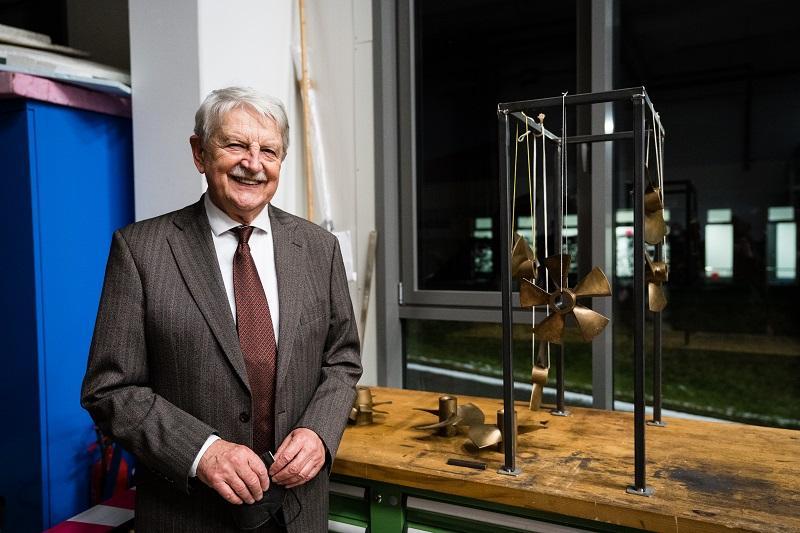People
František Pochylý: Don't look in your drawer!

Professor František Pochylý's quick step and sharp eyes will easily confuse you, few would guess that he celebrated his eightieth birthday in December. Nevertheless, this vital colleague from the Department of Fluid Engineering still goes to the faculty every day, devotes himself to teaching and research and is always ready to absorb any interesting information or insight he comes across. We talked about how the work of hydromechanics experts has changed over the years, but also whether there are coincidences or whether computers will outperform the logarithmic ruler.
Dear Professor, what keeps you so fit?
Ideas. And also young people, students. I really like to teach. I worked in industry for twenty years, but then I went to BUT and have been here ever since.
How has teaching changed over the years?
It is, of course, different, as the field develops, so does teaching. Computers are very important today, but I can't say whether it's good or bad. In the past, more time was devoted to theory and analysis in teaching, today students learn to work with software instead. I believe that in the past, thanks to a more thorough knowledge of theory, people were able to simplify complex mathematical models, were able to neglect unimportant things and use approximate methods. Then calculations were made on a logarithmic ruler and one got fairly accurate results. When I worked at Sigma Olomouc in the 1960s and 1970s, we were able to achieve similar precise results to those produced by powerful computers today. But I don't want to completely condemn computers, computational modelling allows us to do things that were previously unthinkable.
Do you prefer to use your intuition rather than a computer?
Of course. As part of one of my postgraduate studies, I dealt with the qualitative properties of differential equations. Thus, without solving the equation, you can estimate in advance what to expect from its shape, the value of the coefficients and other properties. And this has been the basis of my work for the last fifty years: I have understood that if I understand mathematics and physics well, if I have interdisciplinary knowledge, I can predict many things. But acquiring analytical knowledge is very difficult, it requires constant study.
You mentioned multidisciplinary knowledge. The department where you work and you have been at the head of for many years works a lot in this direction as well, doesn't it?
Classical departments, such as the department of flexibility, I think have already survived. Rather, interdisciplinary teams composed of experts in mathematics, physics, mechanics, or perhaps botany should be created at institutes. When I led our union, I tried to move it in this direction. And for example, our latest water treatment research, CaviPlasma, would never have come about without the collaboration of hydromechanics, thermomechanics, physicists, electrical engineers and botanists.
Where does a person as an individual come to such a broad scope?
I really like going to scientific councils, defences, I work for TA CR,... Thanks to this, I have the opportunity to get to know different types of projects, which inspires people wonderfully. You just listen, store the information in your subconscious, and one day an interesting idea will emerge from it. One must gather knowledge wherever possible. That is also why I have every degree from somewhere else: an engineer from the hydraulic machinery studio in Bratislava, a candidate of science from the military academy, an associate professor from today's BUT and a professorship from Ostrava.
You worked for many years at Sigma Olomouc, it was a very important company at the time. What did you do?
At the beginning, I started construction at Sigma and immediately found out that I couldn't do anything at all. That's why I immediately applied for a postgraduate course in mechanics at BUT. That's when I also learned to work on the first computers and I was very hooked, it was something new. Although of course back then we had a computer at Sigma that was across three rooms. But we really used the most modern methods. The finite element method was beginning to be developed, and we were the first in the country to have it programmed and solved strength problems with its help. By then I was already working in research.
How did you finally get from Sigma Olomouc through the state forests to BUT?
I knew Professor Druckmüller, the father of our current colleague, the mathematician Miloslav Druckmüller. He convinced me to go to university and arranged for me to start here. I respected him a lot. He painted well and gave me two of his paintings, which are still hanging here in my office today, so I have a memory of him. I joined the faculty in September 1986 and have been here ever since.
You have received numerous awards for your work. Is there one that you respect the most?
I didn't think about it that way. Any appreciation of work makes a person happy, but it is not the most important thing for me. I am very happy that I think we managed to create an open and even family atmosphere at the department, where people communicate with each other, wish only the best, do not envy each other, do not hide their ideas in a drawer, but instead work together. I think everyone understood that they always have more to gain than to lose by sharing their knowledge.
When design helps. With the design of a dog wheelchair, the student succeeded in an international competition
Working with the handicapped people brought Pavel Mikuláček a new perspective
I don't call the students by name, I respect them very much, says Šárka Mikmeková
Applied math is a huge help, but it need people who understand it deeply
Heatman Marek Scholler transmits energy not only on stage